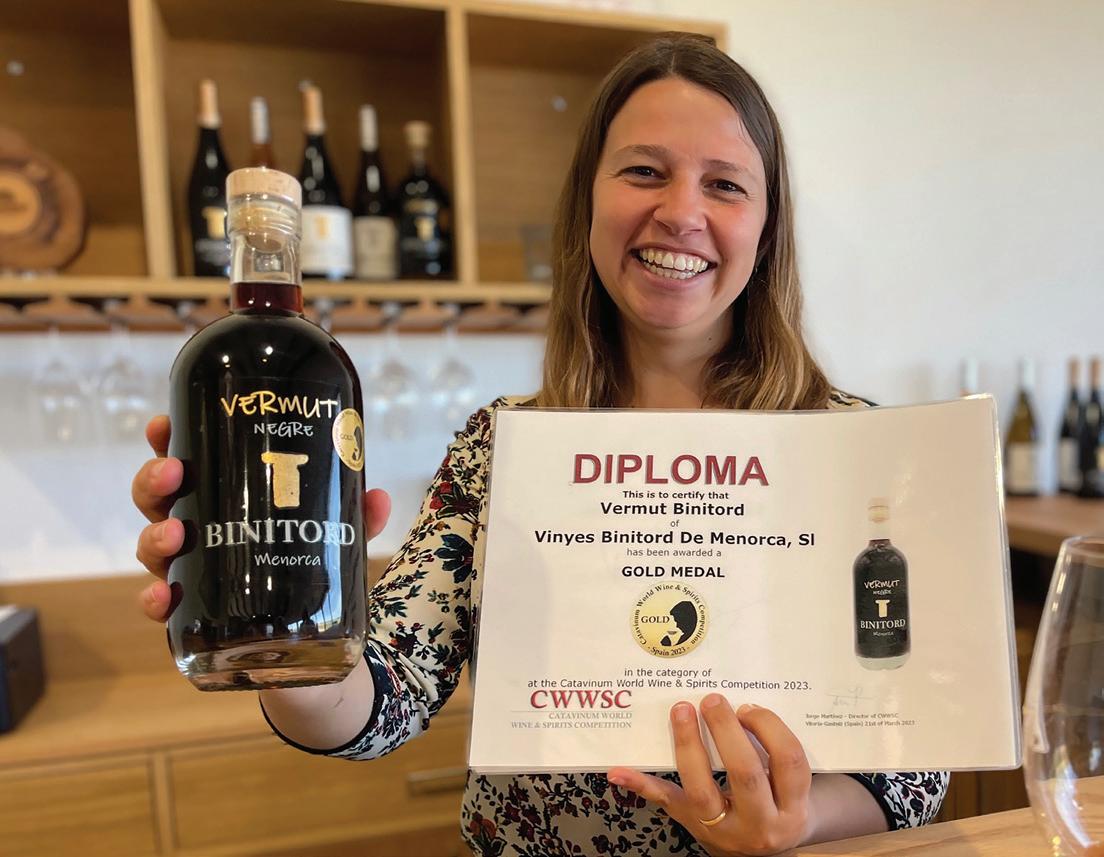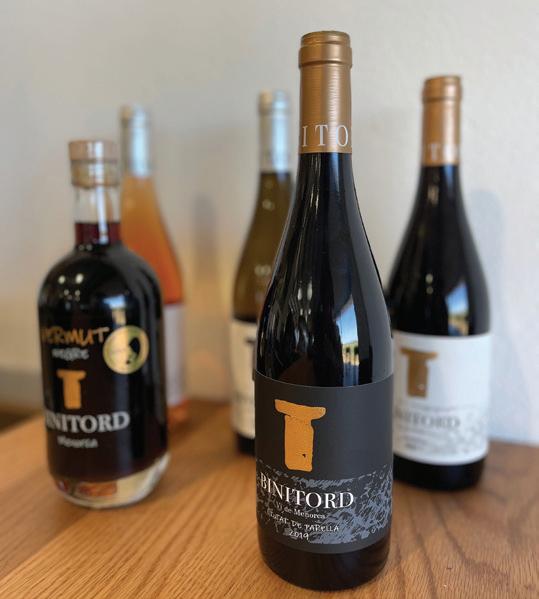
4 minute read
VINYES BINITORD
Land Stewardship Initiatives - Flowers, kestrels, sheep and horsetails
When I visited the vineyard in early May, there was a beautiful display of herbs and wild flowers, including poppies, growing between each row of vines. The roots of these plants penetrate the soil, making it less dense and more like a sponge, so that rainwater can be absorbed much more efficiently. They also attract insects and wildlife and help keep the natural predators away from the vines.
One of the most successful investments Binitord has made, with the help of GOB, is the installation of nesting boxes for kestrels. There are three of these located on tall poles, spread around the fields. Before the boxes were installed, sparrows and wood pigeons were eating 30-40% of the production. Now, with the kestrels on patrol, the loss of grapes has been reduced to just 1-2%. GOB has an animal sanctuary based at the Lithica quarry, near Ciutadella, which receives baby kestrels which have fallen from their nests. These are reared by volunteers and trained to hunt. They are then released back into the wild, and some were released at Binitord. They also have an owl nesting box on the side of the main building.
In the winter, between October and February, Binitord brings sheep from the neighbouring farm onto their land to graze and keep the weeds under control. A benefit for both parties. Clara heard an interesting story from a French visitor. They told her that when their baby lambs were still suckling, they fed them a vine leaf. They disliked it so much that they would never eat a leaf again when they were fully grown.
Another project has been to bring ladybirds to the vineyard to eat the smaller pests. In winter, the ladybirds require protection from the elements, and Clara is working with GOB to create ladybird ‘hotels’. These will be areas of dense aromatic herbs, one in each field, where the ladybirds can take shelter. Without the ladybirds, it would have been necessary to use pesticides every two weeks. Clara has been using biodynamic products, such as one based on the horsetail plant. This is an effective ecological treatment against pests and diseases caused by fungi, and serves as an insecticide against aphids and mites.
Binitord produces a young red wine, Binitord Negre, which is ideal for keeping in the fridge and drinking in summer. The skins and seeds are extracted earlier, to produce a lighter wine without tannins.
Clara has also taken great care over choosing the best barrels in which to mature the wine. She tried both French and American oak barrels and then asked her distributors to decide their favourite, using a blind test. They all selected the wine matured in the American oak barrels. The American oaks are actually grown in Catalonia, and so the barrels do not have too far to travel. The Ciutat de Parella is matured in the barrels for 2 years.
Award winning Vermut

And so to the Vermut. As we moved down to the bottling area, there was a lovely aroma of wine and herbs. In the production process, wine is mixed with 30 aromatic herbs. Local plants such as rosemary and lavender are used along with artemisia (mugwort) which is the special ingredient in the recipe of vermouth.
Clara tried many sweeteners but not satisfied, she makes her own caramel in-house to complete the recipe. The beautiful bottles are gravity filled to ensure the highest quality is maintained to the end of the process. The Vermut was awarded the Gold Medal in the Catavinum World Wine and Spirits Competition Spain 2022.
If you live near Mahon, Bintord wines can be bought at the GOB Menorca shop in Es Claustre, which is run by volunteers.
Attention to Detail
Everything on the farm is done by hand, including the picking of the grapes and the pruning of the vines. There is great attention to detail with every step. Picked grapes are placed in boxes of just 15 kg so that they do not get damaged or crushed. The picking takes place over several weeks in August as the grapes come to perfection at different times in different area of the vineyard.
The vines are fed by a watering system, but this is used as little as possible. More water leads to bigger grapes of lower quality. Clara experimented and tried to not water the vines at all one year, but in the end they needed a small amount of water. Because Menorca is a very humid environment, the vines are trained up vertically, between two rows of wires, preventing them from forming a dense bush. This allows plenty of fresh air and sun to get to the grapes.
Wine Production
Having toured the vineyard, we moved into the main building where the wine is made. When the business was young, the friends discovered an ancient quarry on the land. This was excavated and turned into the production facility, minimising the environmental impact. The building has since been extended above ground, but the quarry is still visible below in the bottling area. Cutting marks on the wall show how the quarry stone was excavated by hand.
Binitord now produces 32-34,000 bottles of wine a year, most of which are consumed on the island. The five products produced are: Binitord Blanc, Binitord Rosé, Binitord Negre, Ciutat de Parella and Binitord Vermouth.

Clara explained the different production processes for each of the wines. The amount of time the skin is left in the production process affects the colour of the wine. Grapes for white wine are refrigerated, then pressed and left to ferment at low temperatures. For the red wines, the grapes are not pressed but fed into the tank complete with skin, seeds, and pulp. The contents of the tank have to be fully mixed two to three times a day to stop the skins rising to the top and becoming acidic.
Tours of the vineyard in English are available Monday, Tuesday, Thursday, and Friday at 4.30pm and 10am on Wednesday. Places can be reserved on the website https://www.binitord.com/en/content/11-visitas and the cost is 15 Euros to be paid on arrival.

Vinyes Binitord de Menorca S.L., Camí Lloc de Monges s/n 07760 - Ciutadella de Menorca. Tel: +34 665 560 224 Email: info@binitord.com
Binitord signed up to the Land Stewardship Programme in Menorca. This Custòdia Agrària project was created by GOB Menorca in 2004 to promote environmental and economic sustainability amongst Menorca’s farmers. 34 companies are now signed up and therefore committed to a series of sustainable agricultural practices. GOB Menorca’s main objective is to reconcile human activities with environmental values.
As part of the programme, GOB has made 180 investments in farms over the last 5 years. These are grouped into 5 action blocks: Habitat conservation, improving soil fertility, biodiversity conservation, improving water resources and restoring landscapes.










